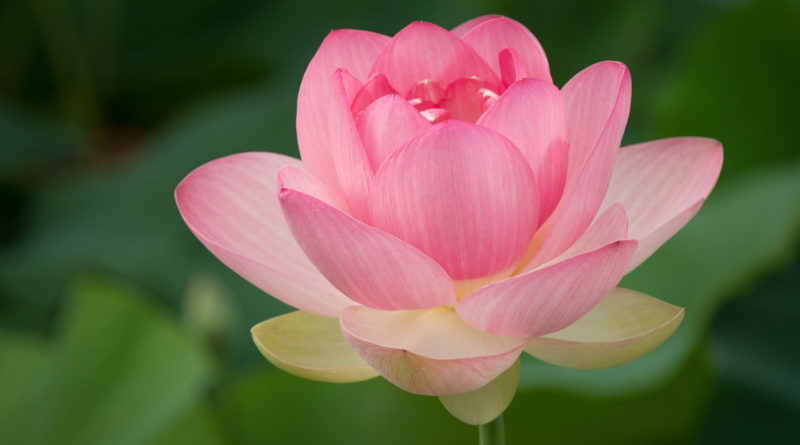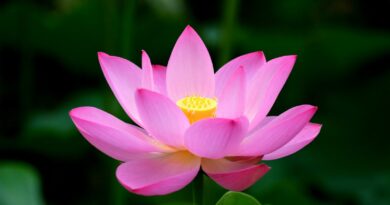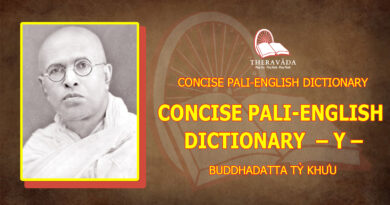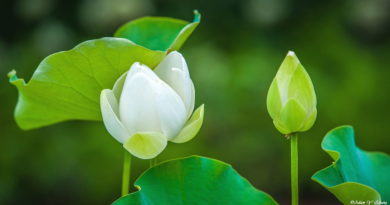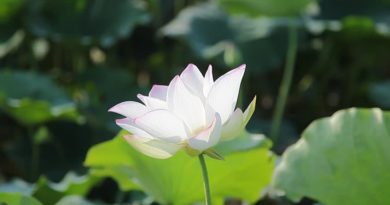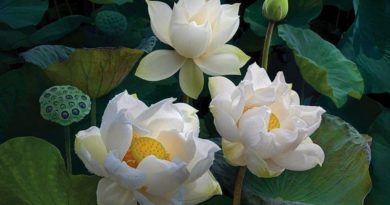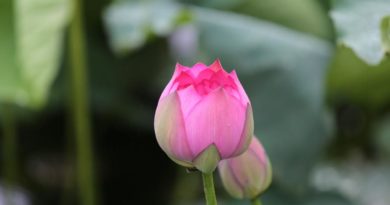DHAMMA PADETHA – 16. ACCUMULATE AND SHARE THE MERIT
DHAMMA PADETHA – ACCUMULATE AND SHARE THE MERIT
Buddhists believe and depend on doing merits. They wish to do dana merit and keep performing libation. In doing merit they have the same desire. But they have different attitudes in sharing the merit. Some people think that the work is done after giving dana, and there is no need to pour libation water. Yet, some think that it is more beneficial to pour libation water and share the merit.
The act of pouring libation water tends to increase the merit
(1) You give charity verbally,
(2) You pray for the blessings you wish for,
(3) After giving charity you share the merit with other people.
You are doing these three things
(1) Out of the offertories gold, silver and money which the monks are not allowed to hold and food that is for other days, are presented by word of mouth. Monasteries and buildings that you cannot lift are offered by word of mouth and pour donation water. For what you have offered with your own hand you pour donalion water and say it verbally again to multiply your dana. That is why to increase your dana, verbal offering, pouring donation water should be done.
But pouring donation water is not the main thing. Reciting and saying it with real volition (cetana) enthusiastically is the essential thing.
(2) Praying for the blessings you wish for is a thing done by Buddhas-to-be and virtuous people. Ashin Anuruddha-to-be when he was a grass carrier (seller) after offering “alms-food” prayed that he may never be born in a poor family in every existence and that he may never hear and know the word ‘there isn?t?. His wishes were fulfilled when he became Prince Anuruddha. That is why, to pray for things is beneficial and should be done.
(3) Sharing the merit after giving charity is for other people to get the merit you have done. Though there are no material things, it is a kind of giving charity. Those who say ‘welldone’ (sadhu) also get their merit increased. That is why, sharing of merit should be done, because merit is increased for oneself and others.
The Would-be-Ashin Anuruddha, who had prayed for etadagga, the most honoured title in having the divine eye (dibbacakkhu abhinna) during the life-time of Padumutra Buddha, became a poor grass carrier! seller in one existance who had to stay in the house of rich man Sumana, and, was called poor man Annabhara before the time of appearance of Gotama Buddha.
While Annabhara came home carrying grass bundles and crossing a jungle, Uparitha Pacceka Buddha having risen from attainment of extinction (nirodha samapatti) came through the air, descended in front of Annabhara, grass carrier, holding the alms-bowl. The Pacceka Buddha went on for alms-round. Annabhara approached the Pacceka Buddha, asked for the alms-bowl and went home in a hurry.
When he arrived home he urged his poor wife to put his one-meal into the alms-bowl. He told his wife that they were poor and had difficulty for food, clothing and shelter because they had done very little merit in their previous lives. Sometimes when there were things to offer there was no one to receive. When there was someone to receive, there was nothing they could offer. Now they have met the Pacceka Buddha to accept their offerings. There was also one-meal ready. Therefore, they offered it happily and delightfully.
Since the poor wife had been endowed with saddha and also because she was pleased with what her husband had said, she put the meal prepared for Annabhara and for herself, all into the alms-bowl.
Annabhara took the alms-bowl to the Pacceka Buddha and offered it. When the Pacceka Buddha had finished eating Annabhara prayed that because he had offered one-meal he may never he reborn in the family of the poor in eveiy existence and may he never hear or know the word ‘there isn’t’.
Annabhara’s alms-food offering had these qualities:
(I) The receiver was a Pacceka Buddha Arahant
(2) The time was, when he had risen from Nirodha Samapatti
(3) The offering was obtained by a lawful fee that Annabhara had for cutting grass
(4) The cetana in offering was extremely sincere.
That was why the offering would give the benefit of making a rich man out ot a poor man.
Thus, because the benefit was so great in offering of the one-meal, the guardian Spirit of the Umbrella uttered in a loud voice ‘sadhu’, When rich man Sumana asked the reason for saying sadhu the deva replied that it was for Annabhara’s offering of one meal.
Sumana rich man asked why she did not say sadhu for his daily alms-food offerings but called sadhu for Annabhara’s one meal offering. The deva replied that it was because there was much benefit. On hearing that Sumana rich man asked Annabhara to sell his merit for one coin. Annahhara refused and said he could not do so. The rich man in creased the money up to a thousand coins. Still Annabhara refused to sell and the rich man eventually asked him to share the merit with him so that he could say sadhu.
Annabhara went to the Pacceka Buddha and asked whether he should share the merit or not. The Pacceka Buddha replied ‘AnnabhAra, in a village where there are a hundred houses, there is light in one house. People from (99) houses came to get the light. In so doing, the light in the first house does not diminish and there were more lights in the (99) houses. In the same way, when you share the merits it will not diminish for you while those who say sadhu also get the merit and thus it is multiplied.
Annabhara came home and shared the merits with Sumana rich man. The rich man after giving him a thousand coins promised to give him other necessities and took him to the king. The king also gave him a thousand coins and a plot of land to build his house. While clearing the land to build the house, golden pots came up and Annabhara became a rich man. (Am ttha 1/146)
Motto: Accumulate and share the merit said Pacceka, like lights truly gain benefit.

